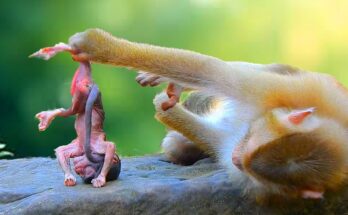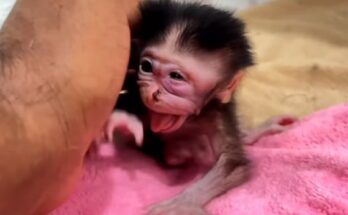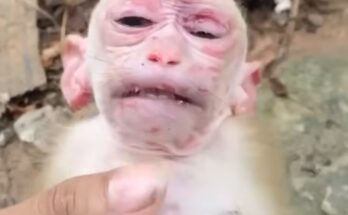In the dense canopy of a tropical rainforest, where the sunlight barely pierces through the thick foliage, a tiny baby monkey clings nervously to a slender branch. Barely a few months old, this infant is still learning the ways of the wild—how to swing, balance, and leap like the rest of his troop. His wide, curious eyes dart from branch to branch, eager to explore, unaware of the risks that lie with every tiny misstep.
One careless move, and it happens.
With a shaky grip, he tries to follow his older siblings across a narrow vine, but his little hands slip. Time seems to freeze as the baby monkey tumbles through the air, flailing helplessly. Leaves and twigs rush past his eyes in a green blur. Then—thud!—he lands upside down in a patch of soft undergrowth. It isn’t a hard fall, but it’s enough to frighten him to his very core.
The forest, once alive with the songs of birds and rustling leaves, momentarily quiets as a high-pitched cry breaks the calm. The baby monkey, disoriented and frightened, begins to wail loudly—his small face scrunched up in distress, his chest heaving as he calls out for help. His cries echo through the trees, raw and pitiful, a sound filled with panic and vulnerability.
Almost instantly, the mother monkey arrives, leaping down with wide, alert eyes. She scoops him up, checking his limbs and cradling him close. The baby buries his face in her fur, still sobbing, hiccuping between cries. She soothes him with gentle strokes and soft murmurs, rocking him back and forth in a way only a mother can.
Though unharmed, the fall leaves a mark—not on his body, but on his tiny heart. A reminder that even in a world as vibrant and free as the jungle, fear can come crashing down in the blink of an eye.


